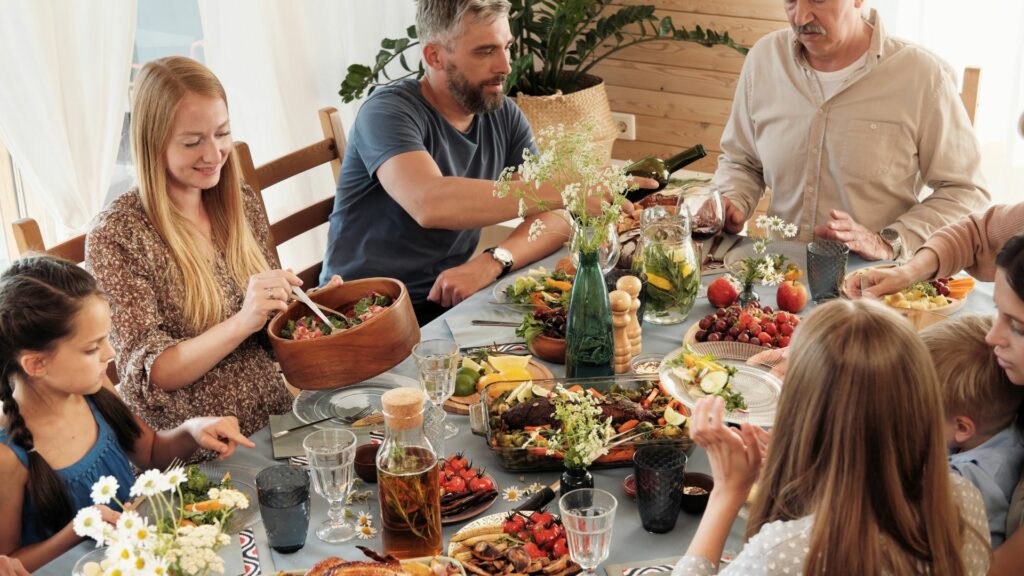Hunger and Homelessness Awareness Week – November 12-20, 2022
Hunger and Homelessness Awareness Week falls just before Thanksgiving and can be a powerful opportunity to help children better understand some of the complex issues surrounding poverty. As you take time to consider what you are thankful for, you might also allow time to reflect on the difficulty so many of our neighbors have simply to stay safely housed and fed.
To facilitate conversation, we put together some activities and discussion points you can use together as a family. Although the conversations may be difficult, and you may not have all the answers, discussions like these help cultivate empathy and compassion. Consider challenging each other to have one or two focused conversations each week in November and think about ways you can diminish the effects of food and housing insecurity in your community throughout the year.
Have a Discussion Around the Table
Living in Poverty
From “Facing Poverty: Laboring Against Its Challenges,” these prompts are designed to help you learn about the resourcefulness required to survive in poverty in the United States. This activity is aimed at raising your awareness of some daily struggles people living in poverty may face. Choose a few questions and answer to the best of your ability.
- You have no money. How would you get by for three weeks while waiting for your first paycheck?
- How do you keep food cold without a refrigerator? How would you prepare a meal without owning a stove?
- How can you get tons of newspaper and cardboard to sell at recycling centers? Where can you sell these items? How much will you get?
- What would you do to survive without garbage service, utilities, or a telephone?
Facts about Poverty
- According to Feeding America, nearly 1 in 8 Georgians is living with food insecurity, including 1 in 6 children. Hunger can have a significant impact on children. In what ways do you think a child’s health, growth, development and school performance can be affected by hunger?
- Some people feel that it’s a person’s own fault if they become homeless. The truth is people become homeless because they can no longer afford their rent for a variety of reasons from job loss, a healthcare crisis, increased rent costs, a family emergency, addiction or others. Discuss how having or not having family members who can help or another support system plays a role in people becoming homeless.
- The cost of groceries has risen 13% over the last 12 months. The average cost for a two-bedroom apartment in Roswell has risen from $1270 in August 2019 to $1850 in October 2022. (Sources: Consumer Price Index and Zumper) How do rising prices disproportionately affect those with low incomes? How do they impact professionals with middle-range wages like teachers, social workers and police officers?
Watch Something Together
Put yourself in the shoes of someone experiencing poverty or homelessness by watching a movie or video on the subject. Discuss what impacted the protagonist most, either good or bad.
On Netflix:
- The Pursuit of Happyness
- The Florida Project
- All Together Now
- Maid (Series)
On YouTube:
- @home: Housing First – Solution to End Homelessness (short film)
Read A Book Together
These books speak to children on their level to help kids process how they can connect with children from different circumstances with empathy and respect.
- Crenshaw, Katherine Applegate
- Hold Fast, by Blue Balliet
- Rich: A Dyamonde Daniel Book
- A Place to Stay: A Shelter Story
- No Fixed Address, by Susin Nielson-Fernlund
- On Our Street, by Roberts Jillian
- Just Under the Clouds, by Melissa Sarno
- Fly Away Home, by Eve Bunting
- A Shelter in Our Car, by Monica Gunning
Take a Deeper Dive – Read a Book or Listen to a Podcast on Your Own
Podcasts:
- Understanding Homelessness Podcast
- Homelessness Is Solvable Podcast
Books:
- Evicted: Poverty & Profit in the American City, by Matthew Desmond
- No Room of Her Own: Women’s Stories of Homelessness, Life, Death and Resistance, by Desiree Hellegers
- Better Must Come by Matthew Marr
- Struggle in Paradise, by Stuart Perlman
- Invisible Child: Poverty, Survival and Hope in an American City, by Andrea Elliott
- The Soloist, by Steve Lopez
Get Involved
What information impacted you most? If you want to affect change, the first step is to talk about it. Here are some ways to raise awareness in your community.
- Write your state legislators about issues around food and housing insecurity. Tell them your ideas for legislation that could help ease hardship.
- Write your national legislators. What could we do as a country to fight hunger and homelessness across the country?
- Speak at your city council meetings. Most decisions that affect our daily life happen where we live. How can you partner with your mayor and city council to bring about positive change?
- Write a letter to the editor. Help bring attention to an issue and put forward a solution or organization who is making a difference. Be concise, propose a solution and be specific.
- Atlanta Journal Constitution – If you would like to submit a letter to the editor, email letters@ajc.com or call 404-526-7003. You can also fax letters to 404-526-5746. Email submissions are preferred. Letters must be no longer than 150 words and must include a daytime phone number for verification.
- Appen Media
Take Action
Make a list of things you can do together as a family help the most vulnerable in your community. Consider going shopping and donating food to your local food pantry or organizing a drive for specific, hard-to-come-by items like toiletries, diapers or personal hygiene kits. Be creative and check-in with local organizations for specific needs.
NFCC welcomes food drives at any time of year. We also have several help from home volunteer projects that are perfect for families.






